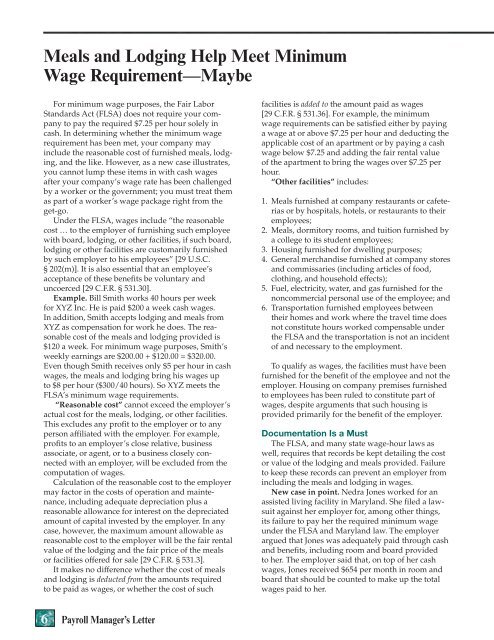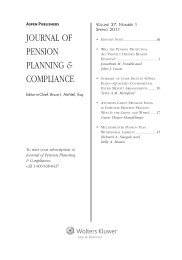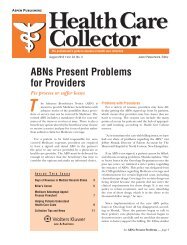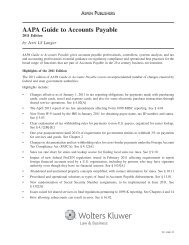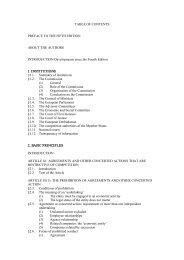Payroll Manager's - Kluwer Law International
Payroll Manager's - Kluwer Law International
Payroll Manager's - Kluwer Law International
Create successful ePaper yourself
Turn your PDF publications into a flip-book with our unique Google optimized e-Paper software.
Meals and Lodging Help Meet Minimum<br />
Wage Requirement—Maybe<br />
For minimum wage purposes, the Fair Labor<br />
Standards Act (FLSA) does not require your company<br />
to pay the required $7.25 per hour solely in<br />
cash. In determining whether the minimum wage<br />
requirement has been met, your company may<br />
include the reasonable cost of furnished meals, lodging,<br />
and the like. However, as a new case illustrates,<br />
you cannot lump these items in with cash wages<br />
after your company’s wage rate has been challenged<br />
by a worker or the government; you must treat them<br />
as part of a worker’s wage package right from the<br />
get-go.<br />
Under the FLSA, wages include “the reasonable<br />
cost … to the employer of furnishing such employee<br />
with board, lodging, or other facilities, if such board,<br />
lodging or other facilities are customarily furnished<br />
by such employer to his employees” [29 U.S.C.<br />
§ 202(m)]. It is also essential that an employee’s<br />
acceptance of these benefits be voluntary and<br />
uncoerced [29 C.F.R. § 531.30].<br />
Example. Bill Smith works 40 hours per week<br />
for XYZ Inc. He is paid $200 a week cash wages.<br />
In addition, Smith accepts lodging and meals from<br />
XYZ as compensation for work he does. The reasonable<br />
cost of the meals and lodging provided is<br />
$120 a week. For minimum wage purposes, Smith’s<br />
weekly earnings are $200.00 + $120.00 = $320.00.<br />
Even though Smith receives only $5 per hour in cash<br />
wages, the meals and lodging bring his wages up<br />
to $8 per hour ($300/40 hours). So XYZ meets the<br />
FLSA’s minimum wage requirements.<br />
“Reasonable cost” cannot exceed the employer’s<br />
actual cost for the meals, lodging, or other facilities.<br />
This excludes any profit to the employer or to any<br />
person affiliated with the employer. For example,<br />
profits to an employer’s close relative, business<br />
associate, or agent, or to a business closely connected<br />
with an employer, will be excluded from the<br />
computation of wages.<br />
Calculation of the reasonable cost to the employer<br />
may factor in the costs of operation and maintenance,<br />
including adequate depreciation plus a<br />
reasonable allowance for interest on the depreciated<br />
amount of capital invested by the employer. In any<br />
case, however, the maximum amount allowable as<br />
reasonable cost to the employer will be the fair rental<br />
value of the lodging and the fair price of the meals<br />
or facilities offered for sale [29 C.F.R. § 531.3].<br />
It makes no difference whether the cost of meals<br />
and lodging is deducted from the amounts required<br />
to be paid as wages, or whether the cost of such<br />
facilities is added to the amount paid as wages<br />
[29 C.F.R. § 531.36]. For example, the minimum<br />
wage requirements can be satisfied either by paying<br />
a wage at or above $7.25 per hour and deducting the<br />
applicable cost of an apartment or by paying a cash<br />
wage below $7.25 and adding the fair rental value<br />
of the apartment to bring the wages over $7.25 per<br />
hour.<br />
“Other facilities” includes:<br />
1. Meals furnished at company restaurants or cafeterias<br />
or by hospitals, hotels, or restaurants to their<br />
employees;<br />
2. Meals, dormitory rooms, and tuition furnished by<br />
a college to its student employees;<br />
3. Housing furnished for dwelling purposes;<br />
4. General merchandise furnished at company stores<br />
and commissaries (including articles of food,<br />
clothing, and household effects);<br />
5. Fuel, electricity, water, and gas furnished for the<br />
noncommercial personal use of the employee; and<br />
6. Transportation furnished employees between<br />
their homes and work where the travel time does<br />
not constitute hours worked compensable under<br />
the FLSA and the transportation is not an incident<br />
of and necessary to the employment.<br />
To qualify as wages, the facilities must have been<br />
furnished for the benefit of the employee and not the<br />
employer. Housing on company premises furnished<br />
to employees has been ruled to constitute part of<br />
wages, despite arguments that such housing is<br />
provided primarily for the benefit of the employer.<br />
Documentation Is a Must<br />
The FLSA, and many state wage-hour laws as<br />
well, requires that records be kept detailing the cost<br />
or value of the lodging and meals provided. Failure<br />
to keep these records can prevent an employer from<br />
including the meals and lodging in wages.<br />
New case in point. Nedra Jones worked for an<br />
assisted living facility in Maryland. She filed a lawsuit<br />
against her employer for, among other things,<br />
its failure to pay her the required minimum wage<br />
under the FLSA and Maryland law. The employer<br />
argued that Jones was adequately paid through cash<br />
and benefits, including room and board provided<br />
to her. The employer said that, on top of her cash<br />
wages, Jones received $654 per month in room and<br />
board that should be counted to make up the total<br />
wages paid to her.<br />
6 <strong>Payroll</strong> Manager’s Letter


